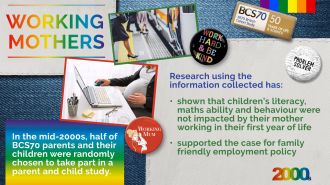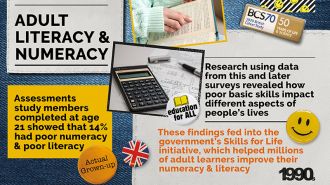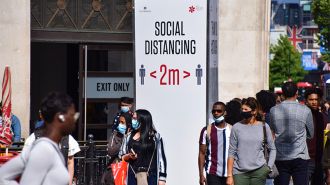
- Our studies
- Our research
- Publications and resources
- Data access and training
- About
- News
- Events
- Get in touch
- Join our mailing list

Welcome to our news and blogs section. Here you’ll find the latest developments and insights from across our longitudinal studies.
Data from the 1970 British Cohort Study (BCS70) Age 51 Sweep are now available to download from the UK Data Service.

Researchers from around the world have been using CLS study data to tackle important questions. Here is a round-up over 40 new pieces of research that we’ve added to the CLS bibliography between October and December 2020.

With the whole country in lockdown again, the UCL Centre for Longitudinal Studies (CLS) is conducting another web survey of thousands of cohort study participants, to find out how the COVID-19 pandemic continues to affect the lives of different generations of people in the UK.

This project aims to develop a conceptual and empirical understanding of social isolation across the life course and generate comparable measures across cohorts.

The 1970 British Cohort Study (BCS70) has been an important resource for research into the potential impacts on children when mothers return to work.

In the BCS70 Age 34 Sweep, half of cohort members with children aged 16 and under were randomly chosen to take part in a special study.

Researchers from around the world have been using CLS study data to tackle important questions. Here is a round-up over 100 new pieces of research that we’ve added to the CLS bibliography between April and September 2020.

Celebrating 50 years of the 1970 British Cohort Study – The Age 26 Sweep was the first adult follow-up of BCS70, and over 9,000 cohort members took part.

Celebrating 50 years of the 1970 British Cohort Study – BCS70 findings on adult numeracy and literacy helped to kickstart a series of government education initiatives that would improve the basic skills of millions of British adults during the 2000s.

The Centre for Longitudinal Studies (CLS) has secured funding from the Economic and Social Research Council (ESRC), to further its investigation into the immediate and longer term impacts of the COVID-19 pandemic on people in Britain.

Newly released survey variables for Next Steps sweeps 1-7 (ages 14-20) are now available to download from the UK Data Service under the standard End User Licence (EUL).

CLS is seeking input on the first draft questionnaire of the Age 31 Sweep of Next Steps, a longitudinal cohort study following 16,000 people born in England in 1989-1990.

The number of hours worked in Britain dropped significantly in lockdown, with mothers most likely to sacrifice work for home schooling and developmental play, according to new research from the UCL Centre for Longitudinal Studies (CLS).
Ryan Bradshaw
Senior Communications Officer
Phone: 020 7612 6516
Email: r.bradshaw@ucl.ac.uk